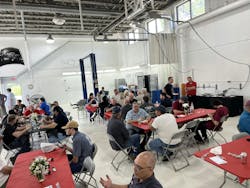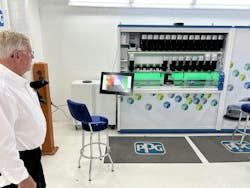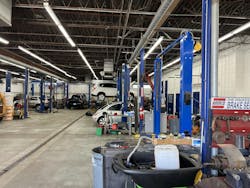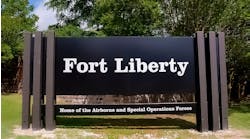For automotive repair students in the Twin Cities metro area of Minnesota, the Newgate School’s Annual Kick-off BBQ in early June was the event to attend, whether they were new or graduating.
The event was not just an occasion to talk about cars and enjoy juicy cheeseburgers fresh off the grill, but also a networking opportunity with professional auto repair workers, shop owners, and operators who might be looking for new hires.
Newgate School was incorporated in 1975 after a brief partnership with the University of Minnesota. The founder, Ron Severson, established Newgate as a separate nonprofit training school dedicated to helping young adults in the area build better lives for themselves and their families by developing lifelong careers in the automotive industry.
Severson, now retired, attended the barbecue at age 85.
“I wanted to start Newgate to provide a comprehensive experience,” Severson said in an interview with FenderBender. “Helping them gain confidence and self-assurance, and then being able to place them in jobs with promising futures where they could build satisfying lives, both in terms of their achievements and financially. That’s what Newgate does.”
Newgate’s Growth
In 1979, Newgate purchased a garage in St. Paul and established the Auto Body Training Center, primarily serving young adults who had dropped out of school or were not succeeding in a traditional classroom setting.
In 1981, Newgate pioneered the concept of using donated vehicle sales as the school’s primary funding source, eliminating dependency on tax-based government funding. This business model continues to be effective today.
“We are fully funded by car donations,” Todd Grothe, the operations manager at Newgate, explained in an interview with FenderBender. “When you donate a car to our program, you receive a tax write-off as a charitable gift donation. Our students then assess the car and determine what repairs are needed.”
Much of their equipment and supplies come from recognizable brands like PPG, Keystone of LKQ, NAPA, and O’Reilly, and they are either offered at a significant discount or donated.
They do have a relationship with the Collision Repair Education Foundation, but it’s complicated because, unlike their other partnerships, Newgate does not charge tuition. “We’re working it out,” he said. “It comes down to some organizations needing more validation that we are indeed a legitimate school.”
Student Life
Newgate began by providing tuition-free auto body repair education and later added mechanical training. It takes 12 to 18 months to complete a program. Arguably, it could take even longer because there is a waiting list of at least a year, according to Grothe. Students are expected to be at the garage from 8 a.m. to 2:45 p.m.
After a full estimate is completed, the students, under the guidance of their two mechanical and two body educator staff, repair the vehicle and then auction it off to fund their program.
Now V. Then
In 1993, Newgate purchased its current property in northeast Minneapolis, which offers more than four times the space. Newgate added an auto mechanics program and more than doubled its student roster. In 1996, Newgate launched the “Wheels for Women” program, repairing higher-quality donated cars that are then provided at no cost to single mothers transitioning into school, work, and self-sufficiency.
Newgate constructed a new modern training facility in 2004 for the expanded Auto Body Repair and Mechanic programs. In 2017, an addition to the auto mechanics shop doubled the capacity of that program. Today, Newgate graduates are thriving throughout the Twin Cities, successfully employed, moving forward positively with their lives, owning homes, raising families, and participating in civic activities.
When asked if he thought Newgate would become as significant and impactful as it has since he started it nearly half a century ago, Severson answered “No,” smiling and reflecting. “When you’re working in a challenging environment, dealing with young people facing difficulties, and there’s insufficient funding to do what you want, you’re focused on resolving issues on a day-to-day basis to keep the program running.”
He concluded, “The real key is to develop a philosophy and a program that addresses the problems… and then finding staff who are dedicated enough to invest the time necessary to develop Newgate into what it is today.”








